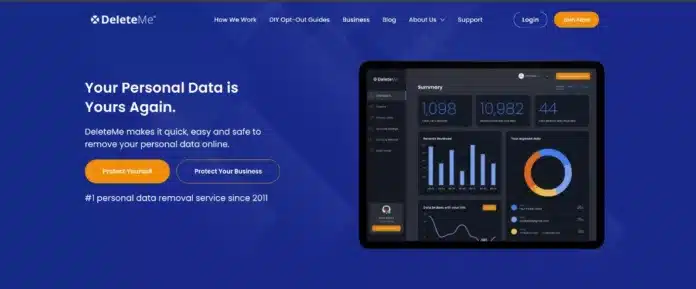Is it time to remove online personal information?
In an era dominated by digital connectivity, the internet plays a central role in our daily lives. From social media profiles to online financial transactions, our personal information is increasingly exposed to the virtual world. While this interconnectedness brings convenience, it also comes with many risks that individuals must be aware of to safeguard their privacy and security. Learn about the risks and consider whether it may be time to remove online personal information. Also, we’ll explain how to remove online personal information from the internet with a simple solution called DeleteMe.
Identity Theft and Financial Fraud: A Growing Concern
Organizations and websites storing user data are susceptible to breaches, leading to the exposure of personal information. For example, in 2022, over 1,000 data breaches were reported, compromising billions of records globally. The domino effect of using the same credentials across multiple platforms makes individuals more vulnerable to extended security threats.
Identity theft is a pervasive threat in the digital age, with cybercriminals leveraging personal information for fraudulent activities. According to a Federal Trade Commission (FTC) report, identity theft topped the list of consumer complaints in the United States. In fact, identity theft comprised 20% of all reported incidents in 2022. This crime can result in financial losses and severe damage to one’s credit score.
Also, other types of financial fraud are on the rise. The exposure of financial information, such as credit card details or bank account numbers, poses a significant risk. As a result, financial fraud involving unauthorized transactions is on the rise. In 2021, the global financial industry reported a 159% increase in account takeover attacks, highlighting the escalating threat to individuals’ financial security.
Phishing Attacks and Scams
Social engineering attacks, where attackers exploit personal information to manipulate individuals, are becoming more sophisticated. With the wealth of online information, attackers can craft convincing schemes to trick individuals into disclosing sensitive information or compromising their security.
In addition, phishing, a tactic where attackers trick individuals into divulging sensitive information, remains a prevalent threat. The Anti-Phishing Working Group (APWG) reported a 64% increase in phishing attacks worldwide in 2021, emphasizing the need for heightened awareness and caution3.
Stalking and Harassment
Publicizing personal details online can expose individuals to the risk of stalking and harassment. Social media platforms, in particular, have become hotbeds for such activities. According to a survey conducted by the Pew Research Center, 41% of Americans have experienced online harassment, ranging from offensive name-calling to more severe forms of abuse4.
Inappropriate or compromising information shared online can have real-world consequences, affecting personal and professional reputations. A study by CareerBuilder found that 70% of employers use social media to screen candidates during the hiring process, emphasizing the impact of online content on career opportunities.
Sharing location-based information online can expose individuals to risks such as burglary or stalking. The increasing use of geotagging on social media platforms has raised concerns about the potential dangers of revealing one’s physical whereabouts.
Employment Consequences: The Impact of an Online Presence
Employers routinely review candidates’ online presence during the hiring process. Conflicting information or inappropriate content can adversely affect job opportunities. According to a CareerBuilder survey, 57% of employers are less likely to interview candidates they can’t find online7.
Data Mining and Profiling: The Price of Personalization
Companies use extensive data mining and profiling to create targeted advertising and personalized experiences. However, this practice raises concerns about privacy infringement. A survey by the Pew Research Center found that 72% of Americans feel that all, almost all, or most of what they do online is being tracked by advertisers8.
Mitigating the Risks: A Call to Action
To mitigate these risks, individuals must adopt proactive measures. This includes being cautious about the information shared online, regularly updating privacy settings on social media platforms, using strong and unique passwords, and enabling two-factor authentication. Staying informed about cybersecurity best practices, monitoring online presence, and remaining vigilant against phishing attempts are essential to protecting personal information in the digital age.
While the internet brings unprecedented opportunities, it exposes individuals to various digital threats. Understanding these risks and taking proactive steps to secure personal information is crucial in navigating the digital landscape safely.
Millions fall victim to their personal information being exposed through a simple Google search each year. A search using your full name and current location can reveal many private details, including addresses, phone numbers, emails, family information, property values, and political affiliations.
Data Broker Services
Data brokers are corporations that collect large amounts of personally identifiable information (PII) and package it to create ‘profiles’ or ‘listings’ with your personal information. These profiles include Social Security numbers, birthdays, and past and recent addresses. These services crawl the web looking for information to build your profile. They find this from government and other public records, self-reported information, social media, and other data brokers.
Remove Your Online Personal Information with DeleteMe
DeleteMe is a service provided by Abine, Inc., based in Boston, USA. It helps users remove their personal information from data brokers to enhance online privacy. It offers a convenient subscription service that autonomously removes your personal information from data brokers, safeguarding it from online sales. Their experts work diligently to eradicate customers’ personal information from search results.
How DeleteMe Works to Remove Personal Information
The service removes personal details from data broker websites, such as names, addresses, ages, phone numbers, emails, and property photos. However, it doesn’t erase information from legitimate websites or news sources. Currently, they remove users from approximately 38 data broker services, primarily US-based. While it focuses on Western aggregators, it may still benefit non-US residents due to data on US websites.
Using DeleteMe is straightforward. Users provide their personal information, including aliases and previous names.
- Name
- Age
- Location
- Photos
- Past Address
- Phone
- Relatives
- Social Media
- Occupation
- Marital Status
- Property Value
Here’s the general process:
| Submit Info | Experts Search For It | Removal Process Starts | Scans & Deletions |
| Provide your personal information for removal from search engines and data broker sites. | Experts locate and remove your personal information. | Receive a detailed report within seven days. An example report is provided. | The service regularly removes your personal information throughout the year. |
Pricing and Plans
There are three subscription plans, from $129 annually for one user to $349 biennially for two users. The service is ongoing, necessitating continuous payments for continued protection.
Privacy and Security
Rob Shavell and Eugene Kuznetsov founded DeleteMe in 2010, recognizing the challenges of navigating privacy issues in today’s interconnected digital landscape. The company is committed to simplifying the process for our customers to reduce risks associated with identity theft, credit card fraud, robocalls, spam, stalking, cybersecurity threats, and unwanted communications. They believe in the right to own, manage, and delete personal information from the web. While it’s possible for anyone to remove themselves from data broker websites, most lack the time, expertise, or resources to navigate the constantly changing landscape of online data brokers.
The company operates within the United States. The privacy policy ensures that customer data won’t be sold and will only be used for service purposes. Some data sharing with data brokers may occur for deletion requests.
- They are the #1 personal data removal service
- PCMag.com rates the service as “Excellent,” naming it the most outstanding product in its category.
- Their private experts have completed 100M+ successful personal data removals.
- They have an A+ rating from the Better Business Bureau
- They offer a 100% satisfaction guarantee.
Customer Service and Support
The company provides a contact form, a help center with FAQs, and live chat support during US business hours. The contact form yields prompt responses, ensuring users can seek assistance. The support team can be reached Monday – Friday: 9 am – 8 pm Eastern Time. The following are the best contact methods:
- Phone: 833-335-3836
- Live Chat: visit joindeleteme.com during office hours and click the “chat with us” button on the bottom right-hand side of the homepage
- Email: Submit your support requests 24/7 by emailing support@joindeleteme.com.
How do I delete my account?
You can “self-delete” your account. Here’s how:
- Select “Account” from the left menu of your dashboard, then select “Billing and Subscriptions.”
- Selecting Delete My Account will bring you to a confirmation page.
- Click yes to complete the account and data deletion process.
More Information
DeleteMe effectively removes personal information from data broker websites, enhancing online privacy. The service can be invaluable if you need to delete your information from the internet.
To see what information a Data Broker stores, read our articles on BeenVerified, Truthfinder, or Intelius.








